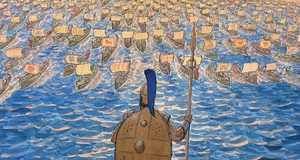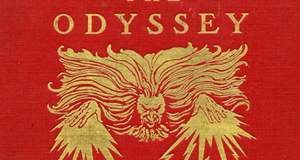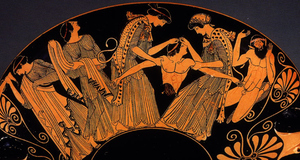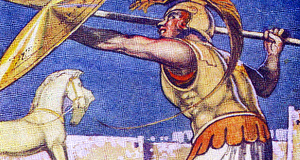The Relationship Between Gods and Humans in Aias and the Poetry of Sapphos
By
2011, Vol. 3 No. 02 | pg. 1/1
KEYWORDS:
Reading Greek plays provides valuable insight into the relationships between gods and humans. While both gods and humans have fairly similar personalities Greek gods have a certain amount of power that, given motivation from an arrogant mortal, they are all too willing to manipulate for their own entertainment without regard to the consequences for others. In Aias, Sophocles begins by telling the story of Ajax some time after the events in Homer’s Iliad. Over the course of the play, Sophocles relates that Ajax feels slighted, because he was not awarded the now-deceased Achilles’s armor. As a result, he decides to try to exact revenge and eventually commits suicide over the blow to his honor, leaving the question of whether his suicide is an honorable action or not. In the play, the relationship of the gods and humans is a malevolent one; the gods do not act as companions or advisors but instead act as strict stewards. In the poetry of Sappho, however, the relationship is quite different. Sappho, a female Greek poet, whose life is shrouded in mystery, depicts the relationship between humans and gods as that of a loving parent, willing to grant assistance when necessary. There is a noticeable contrast evident in the connection between gods and humans in both Sophocles’s Aias and Sappho’s poetry, chiefly in the different types of parental nature that the Gods take in each. One trait present in gods from both the works of Sappho and Sophocles is a parental nature. In both the poetry and the play gods act similar to parents−albeit with different parenting styles−providing advice, admonishments, and assistance to humans. In Aias the god’s parental nature reveals itself at the beginning, when Athena summarizes the events surrounding Ajax for Odysseus. Athena brings Odysseus to witness the maddened state of Ajax, afterwards stating: “consider him well, then, and never allow yourself to speak arrogant words against the gods…” (154-6). Here Athena uses Ajax to teach Odysseus a valuable lesson on the meaning of humility and respect; the advice that Athena gives Odysseus is reminiscent of a parent telling their child to be humble and never disrespect elders. Athena’s characterization in Aias is that of a stern mother, simultaneously looking out for her son while at the same time preemptively reprimanding him for future arrogance or disrespect.Just as Athena acts like a mother in Aias, Aphrodite acts as a mother in the poetry of Sappho. Aphrodite’s nature in Sappho’s poetry is that of a protective mother−Sappho, the speaker, desperately requests romantic assistance, a situation that the reader learns has occurred before. This coddling mother characterization is evident in the first fragment, in which Aphrodite says to Sappho, “Whom shall I persuade this time to welcome you in friendship? Who is it, Sappho, that wrongs you?” (Miller, Fr. 1, 18-20). Evidently Aphrodite is more than willing to appease Sappho’s romantic frustration; she is prepared to go and coerce friendship with Sappho. Thus, Aphrodite also comes off as motherly in Sappho’s poetry, though with a somewhat softer, more maternal nature. Although both Sophocles and Sappho depict gods as parental figures in their works, the gods’ actual characterizations differ greatly. Sophocles portrays Athena in Aias as very stern and authoritative, while in Sappho’s poetry the various gods depicted seem protective and caring, almost pampering Sappho. In Aias, the main interaction is with the god Athena. Athena interferes before the beginning of the play, stopping Ajax from murdering the Greek commanders, Agamemnon, Menelaus, and Odysseus. She prevents an attack by driving Ajax insane, making him believe that he kills the Greek commanders when he actually slaughters cows and sheep: “...I stopped him. Spinning illusions of his own most deadly joy, I drew him to your captured herds…” (60-63). Here we learn that Athena protected Odysseus by resorting to savage means; rather than rousing Odysseus or simply restraining the already crazy Ajax, she augments the madness of Ajax, causing him to butcher helpless livestock.This action demonstrates her characterization as a less maternal figure than Aphrodite in Sappho. Similarly, Athena forces Odysseus to witness the madness of Ajax, sharply telling him to stay and watch: “Stay! Face him! What he has become is no threat to you” (82-3). Athena coerces Odysseus to watch Ajax in his state of madness to teach him a lesson−after they finish talking to Ajax, she warns him against demonstrating conceit. Furthermore she goes on to threaten him, stating that success is fleeting and can be taken away in a day (153-63). Watching Ajax, evidently, is an exercise in learning humility, through both watching the effects of a lack of humility and threats on consequences of acting prideful. In short, Sophocles portrays Athena as a tough-love sort of parent, willing to take a harsh stance to prevent insolent behavior. On the other hand, Sappho portrays gods as benevolent entities, willing to assist in anyway possible to ensure happiness. In contrast to Athena, who threatens punishment, the gods in Sappho’s poetry overindulge Sappho. Generally, the gods from Sappho’s poetry have a greater maternal nature than Athena does in Aias. The first example of this occurs in the very first fragment, where Sappho begs Aphrodite to help her catch the attention of a potential romantic interest. Sappho’s depiction is far more maternal than Sophocles’s; Sappho states that Aphrodite, “with a smile on your immortal face, asked me what was wrong this time, and why I called you this time…” (Miller, Fr. 1, 14-16). Aphrodite comes to Sappho with a gentle disposition, smiling and ready to assist. Although the repetition and emphasis on the word “this” in lines 15 and 16 indicate a sense of long history of similar requests from Sappho, Aphrodite seems to be willing to oblige once again to make Sappho happy. Sappho also depicts this maternal nature in the second fragment, where Sappho calls Aphrodite to a paradisal place in order to celebrate a happy occasion. She asks Aphrodite to celebrate with her because of the nature of their relationship−had Aphrodite not been so supportive and willing to assist, Sappho would probably be more reluctant to include Aphrodite in her celebration. Furthermore, the inclusion of Aphrodite in Sappho’s celebration indicates the dynamic of their relationship, which is similar to the relationship between a mother and a daughter. While in the first fragment Sappho calls upon Aphrodite to help her in a time of need, Sappho also includes Aphrodite in celebrations of happy events thereby demonstrating that their relationship is very close. Sappho’s portrayal of the relationship between her and Aphrodite indicates an intimate mother-daughter dynamic in which Aphrodite comes off as a highly maternal figure. The representation of the relationship between gods and humans in both Aias and Sappho’s poetry indicates a parental relationship between the Greek gods and humans. The gods treat humans as children, with less wisdom and a need for education that they must fulfill. However, the respective representations differ when examining the actual relationship in context. Sophocles depicts Athena as a tough love sort of parent, willing to shock and threaten in order to help in the long run. Her use of Ajax’s madness to teach Odysseus a lesson is a key example of this nature. Conversely, Sappho illustrates a very close relationship with Aphrodite, similar to that between a mother and daughter, confiding in Aphrodite in both celebration and crisis. As a result, Aphrodite’s characterization results in more of a maternal nature than Athena’s. Overall however, it is evident that both writers view gods as authoritative figures, despite the intense similarity in the respective personalities of gods and humans. ReferencesMiller, A.M. (1996). An Anthology in Translation. Indianapolis: PHackett. p. 51-63 (modified). Sophocles. (1998). Aias. New York: Oxford UP.
Suggested Reading from Inquiries Journal
Inquiries Journal provides undergraduate and graduate students around the world a platform for the wide dissemination of academic work over a range of core disciplines. Representing the work of students from hundreds of institutions around the globe, Inquiries Journal's large database of academic articles is completely free. Learn more | Blog | Submit Latest in Literature |















